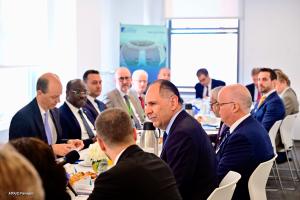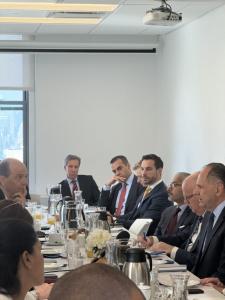Amid unprecedented global challenges and multiplying conflicts, the United Nations Security Council—as the primary organ tasked with maintaining peace and security worldwide—remains more critical than ever. However, widening geopolitical rifts, intensifying political polarization, and the misuse of veto power by its permanent members have paralyzed the Council, constricting its action on pressing issues. Non-permanent, or elected, members, which are elected for two-year terms, have a unique opportunity to positively impact and influence the Council’s work and dynamics.
Ahead of the June 6 Security Council elections1, KAS New York and the Permanent Mission of Greece to the United Nations hosted H.E. George Gerapetritis, Foreign Minister of the Hellenic Republic, on June 4 for a high-level breakfast discussion with distinguished representatives of UN Member States and think tanks on Greece’s priorities for its tenure as an elected member. The discussion underscored the following takeaways:
- The three “D”s—Dialogue, Diplomacy, Democracy—served as a compass for Greece’s candidature and will continue to guide its tenure. Among its priorities as an elected member of the Council, Greece will seek to uphold and strengthen international law and ensure that it protects the most vulnerable; safeguard maritime security to secure the flow of goods; advance the protection of children and women in armed conflict; and galvanize action on the climate crisis.
- Regional conflicts and instability can pose significant threats to global security. As such, the international community should increase efforts towards their peaceful resolution and prevent them from spiraling out of control. In addition to the ongoing crisis in the Middle East, the Sahel and Balkans were highlighted as two regions of concern in need of greater attention and resources. The need for more legal migration pathways was also emphasized, as increasing conflict and violence drive people from their homes.
- Greater coordination and cooperation, rather than parallel initiatives, is needed among international organizations. In particular, it was recommended the United Nations interact more with the African Union, European Union, and Council of Europe. It was further suggested that an alliance of international organizations could serve as an umbrella and coordinate activities, ensuring greater efficiency and effectiveness.
- In spite of frequent deadlock on the Council, it was emphasized that every resolution and declaration can make a difference. The role of the Council’s elected members—or E10—is invaluable in terms of being able to promote or highlight certain issues, build bridges among disputing members, or facilitate constructive dialogue. Coalitions of small- and medium-sized countries can also serve as a powerful counterweight to the great powers.
- Recognizing the important role that all countries play in preserving global peace and security, Greece looks forward to cooperating with other Council members towards the peaceful resolution of conflict and making the Council itself a more effective, representative, inclusive, and transparent body.
1 At a session of the UN General Assembly on June 6, Greece was elected as a non-permanent member. receiving 182 votes. Together with Panama, Somalia, Pakistan, and Denmark, it will start its tenure on January 1, 2025.





